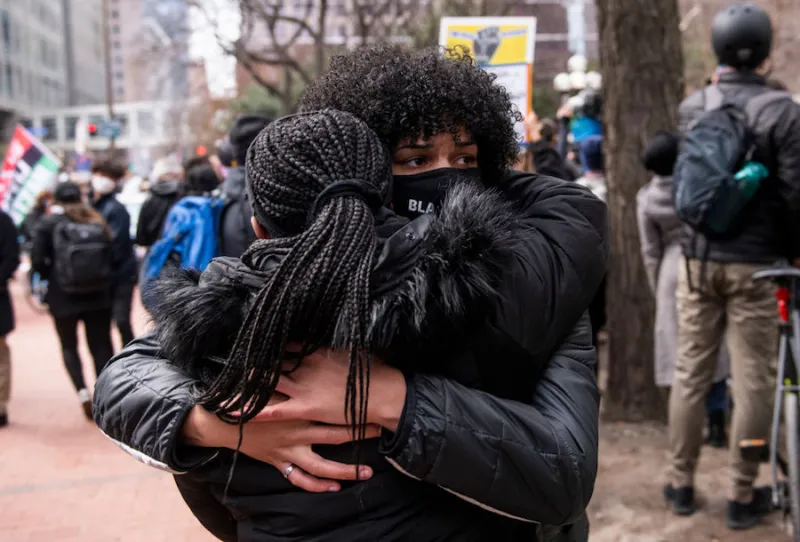
CNA Staff, Apr 20, 2021 / 17:01 pm (CNA).
Archbishop Bernard Hebda of Minneapolis called for peace, reconciliation, and a greater respect for human life after former police officer Derek Chauvin was found guilty of the 2020 murder of George Floyd.
In a statement shortly after the verdict was released, Hebda called it a “sobering moment for our community.”
“The decision by a jury of peers punctuates the grief that has gripped the Twin Cities in these last months and underscores the soul-searching that has taken place in homes, parishes, and workplaces across the country as we together confront the chasm that exists between the brokenness of our world and the harmony and fraternity that our Creator intends for all his children,” he said.
The archbishop pointed to the crucified and risen Christ as the example of “the healing power of forgiveness, compassion, reconciliation, and peace.”
“It is our shared brotherhood with Jesus that calls us to a deeper respect for all human life,” he said. “We ask him to bring healing into our communities, comfort to the family of George Floyd and all who mourn, and satisfaction to those who thirst for justice.”
A jury on April 20 determined that Chauvin was guilty on three charges of unintentional second-degree murder, third-degree murder, and second-degree manslaughter. Chauvin’s trial began on March 8.
On May 25, 2020, Chauvin restrained Floyd, a 46 year-old Black man, during an arrest for using a counterfeit $20 bill.
Video footage from bystanders showed Chauvin kneeling on Floyd’s neck for nearly nine minutes as Floyd audibly gasped, moaned, and complained he could not breathe. Towards the end of the video, Floyd appeared unconscious. After an ambulance arrived and transported Floyd to a nearby hospital, he was pronounced dead.
Chauvin was arrested on May 29 and charged with third-degree murder and manslaughter. Prosecutors later upgraded the charges to second-degree unintentional murder. The four officers who were involved in the attempted arrest, including Chauvin, were fired by the Minneapolis Police Department.
After Floyd’s death, widespread protests, rallies, and riots ensued throughout the country and the world highlighting police brutality and racism.
In his statement, Hebda offered his hope that the “many reminders of the Lord’s loving closeness even in challenging times [may] inspire us to treat each other with unfailing respect, to work non-violently for the common good and to be instruments of reconciliation.”
The U.S. Conference of Catholic Bishops also responded to the verdict.
Bishop Shelton Fabre of Houma-Thibodaux, chairman of the bishops’ Ad Hoc Committee Against Racism, and Archbishop Paul Coakley of Oklahoma City, chairman of the Committee on Domestic Justice and Human Development, released an April 20 statement noting that God is the source of both justice and mercy.
“The death of George Floyd highlighted and amplified the deep need to see the sacredness in all people, but especially those who have been historically oppressed. Whatever the stage of human life, it not only matters, it is sacred,” they said.
“The events following George Floyd’s death also highlighted the urgent need for racial healing and reconciliation,” they added. “As we have seen so plainly this past year, social injustices still exist in our country, and the nation remains deeply divided on how to right those wrongs.”
The bishops prayed that the country may find healing from the wounds caused by racism.
“Let us pray that through the revelation of so much pain and sadness, that God strengthens us to cleanse our land of the evil of racism which also manifests in ways that are hardly ever spoken, ways that never reach the headlines,” they said.
“Let us then join in the hard work of peacefully rebuilding what hatred and frustration has torn down. This is the true call of a disciple and the real work of restorative justice.”
If you value the news and views Catholic World Report provides, please consider donating to support our efforts. Your contribution will help us continue to make CWR available to all readers worldwide for free, without a subscription. Thank you for your generosity!
Click here for more information on donating to CWR. Click here to sign up for our newsletter.





Leave a Reply